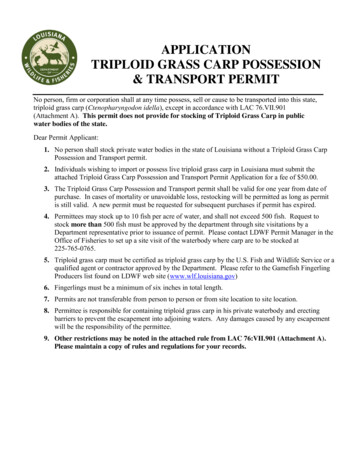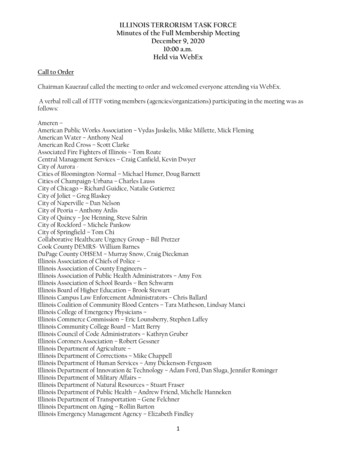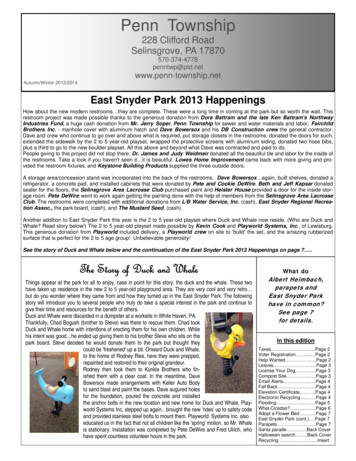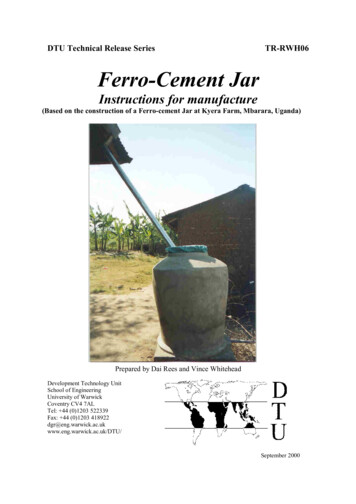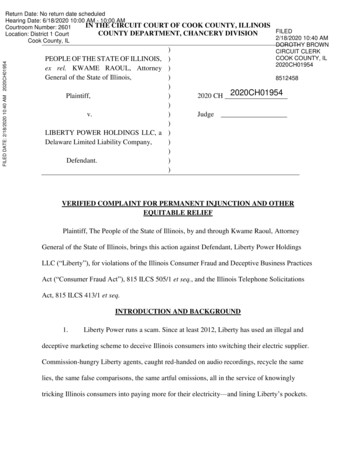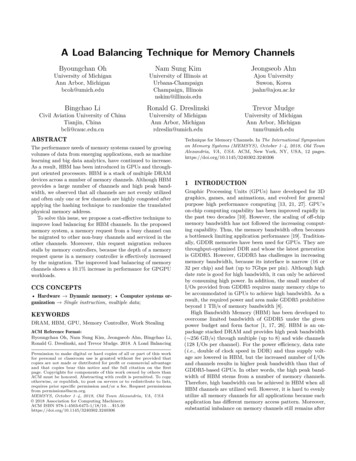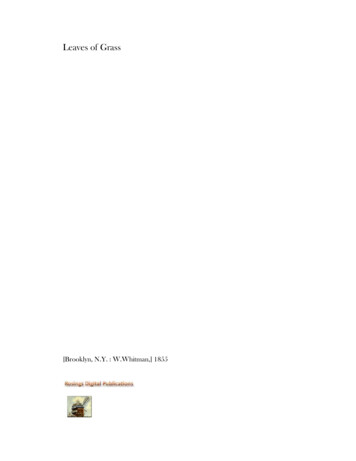
Transcription
Leaves of Grass[Brooklyn, N.Y. : W.Whitman,] 1855
2
Contents[Preface]Leaves of Grass[Song of Myself][A Song for Occupations][To Think of Time][The Sleepers][I Sing the Body Electric][Faces][Song of the Answerer][Europe the 72d and 73d Years of These States][A Boston Ballad][There Was a Child Went Forth][Who Learns My Lesson Complete][Great Are the Myths]3
[Preface]America does not repel the past or what it has produced under its forms or amid otherpolitics or the idea of castes or the old religions . . . accepts the lesson with calmness . . . isnot so impatient as has been supposed that the slough still sticks to opinions and mannersand literature while the life which served its requirements has passed into the new life ofthe new forms . . . perceives that the corpse is slowly borne from the eating and sleepingrooms of the house . . . perceives that it waits a little while in the door . . . that it was fittestfor its days . . . that its action has descended to the stalwart and wellshaped heir whoapproaches . . . and that he shall be fittest for his days.The Americans of all nations at any time upon the earth have probably the fullestpoetical nature. The United States themselves are essentially the greatest poem. In thehistory of the earth hitherto the largest and most stirring appear tame and orderly to theirampler largeness and stir. Here at last is something in the doings of man that correspondswith the broadcast doings of the day and night. Here is not merely a nation but a teemingnation of nations. Here is action untied from strings necessarily blind to particulars anddetails magnificently moving in vast masses. Here is the hospitality which forever indicatesheroes . . . . Here are the roughs and beards and space and ruggedness and nonchalancethat the soul loves. Here the performance disdaining the trivial unapproached in thetremendous audacity of its crowds and groupings and the push of its perspective spreadswith crampless and flowing breadth and showers its prolific and splendid extravagance.One sees it must indeed own the riches of the summer and winter, and need never bebankrupt while corn grows from the ground or the orchards drop apples or the bayscontain fish or men beget children upon women.Other states indicate themselves in their deputies . . . but the genius of the United Statesis not best or most in its executives or legislatures, nor in its ambassadors or authors orcolleges or churches or parlors, nor even in its newspapers or inventors . . . but always mostin the common people. Their manners speech dress friendships—the freshness and candorof their physiognomy—the picturesque looseness of their carriage . . . their deathlessattachment to freedom—their aversion to anything indecorous or soft or mean—the practicalacknowledgment of the citizens of one state by the citizens of all other states—the fiercenessof their roused resentment—their curiosity and welcome of novelty—their self-esteem andwonderful sympathy—their susceptibility to a slight—the air they have of persons who neverknew how it felt to stand in the presence of superiors—the fluency of their speech—theirdelight in music, the sure symptom of manly tenderness and native elegance of soul . . .their good temper and open-handedness—the terrible significance of their elections—thePresident’s taking off his hat to them not they to him—these too are unrhymed poetry. Itawaits the gigantic and generous treatment worthy of it.The largeness of nature or the nation were monstrous without a corresponding largenessand generosity of the spirit of the citizen. Not nature nor swarming states nor streets andsteamships nor prosperous business nor farms nor capital nor learning may suffice for theideal of man . . . nor suffice the poet. No reminiscences may suffice either. A live nationcan always cut a deep mark and can have the best authority the cheapest . . . namely fromits own soul. This is the sum of the profitable uses of individuals or states and of present4
action and grandeur and of the subjects of poets.—As if it were necessary to trot backgeneration after generation to the eastern records! As if the beauty and sacredness of thedemonstrable must fall behind that of the mythical! As if men do not make their mark outof any times! As if the opening of the western continent by discovery and what hastranspired since in North and South America were less than the small theatre of theantique or the aimless sleepwalking of the middle ages! The pride of the United Statesleaves the wealth and finesse of the cities and all returns of commerce and agriculture andall the magnitude of geography or shows of exterior victory to enjoy the breed of fullsizedmen or one fullsized man unconquerable and simple.The American poets are to enclose old and new for America is the race of races. Ofthem a bard is to be commensurate with a people. To him the other continents arrive ascontributions . . . he gives them reception for their sake and his own sake. His spiritresponds to his country’s spirit . . . . he incarnates its geography and natural life and riversand lakes. Mississippi with annual freshets and changing chutes, Missouri and Columbiaand Ohio and Saint Lawrence with the falls and beautiful masculine Hudson, do notembouchure where they spend themselves more than they embouchure into him. Theblue breadth over the inland sea of Virginia and Maryland and the sea off Massachusettsand Maine and over Manhattan bay and over Champlain and Erie and over Ontario andHuron and Michigan and Superior, and over the Texan and Mexican and Floridian andCuban seas and over the seas off California and Oregon, is not tallied by the blue breadthof the waters below more than the breadth of above and below is tallied by him. When thelong Atlantic coast stretches longer and the Pacific coast stretches longer he easily stretcheswith them north or south. He spans between them also from east to west and reflects whatis between them. On him rise solid growths that offset the growths of pine and cedar andhemlock and liveoak and locust and chestnut and cypress and hickory and limetree andcottonwood and tuliptree and cactus and wildvine and tamarind and persimmon . . . andtangles as tangled as any canebrake or swamp . . . and forests coated with transparent iceand icicles hanging from the boughs and crackling in the wind . . . and sides and peaks ofmountains . . . and pasturage sweet and free as savannah or upland or prairie . . . withflights and songs and screams that answer those of the wildpigeon and highhold andorchard-oriole and coot and surf-duck and redshouldered-hawk and fish-hawk and whiteibis and indian-hen and cat-owl and water-pheasant and qua-bird and pied-sheldrake andblackbird and mockingbird and buzzard and condor and night-heron and eagle. To himthe hereditary countenance descends both mother’s and father’s. To him enter theessences of the real things and past and present events—of the enormous diversity oftemperature and agriculture and mines—the tribes of red aborigines—the weather-beatenvessels entering new ports or making landings on rocky coasts—the first settlements northor south—the rapid stature and muscle—the haughty defiance of ‘76, and the war and peaceand formation of the constitution . . . the union always surrounded by blatherers and alwayscalm and impregnable—the perpetual coming of immigrants—the wharfhem’d cities andsuperior marine—the unsurveyed interior—the log-houses and clearings and wild animalsand hunters and trappers . . . the free commerce—the fisheries and whaling and golddigging—the endless gestation of new states—the convening of Congress every December,the members duly coming up from all climates and the uttermost parts . . . the noblecharacter of the young mechanics and of all free American workmen and workwomen . . .the general ardor and friendliness and enterprise—the perfect equality of the female with5
the male . . . the large amativeness—the fluid movement of the population—the factoriesand mercantile life and laborsaving machinery—the Yankee swap—the New York firemenand the target excursion—the southern plantation life—the character of the northeast and ofthe northwest and southwest—slavery and the tremulous spreading of hands to protect it,and the stern opposition to it which shall never cease till it ceases or the speaking oftongues and the moving of lips cease. For such the expression of the American poet is tobe transcendant and new. It is to be indirect and not direct or descriptive or epic. Its qualitygoes through these to much more. Let the age and wars of other nations be chanted andtheir eras and characters be illustrated and that finish the verse. Not so the great psalm ofthe republic. Here the theme is creative and has vista. Here comes one among thewellbeloved stonecutters and plans with decision and science and sees the solid andbeautiful forms of the future where there are now no solid forms.Of all nations the United States with veins full of poetical stuff most need poets and willdoubtless have the greatest and use them the greatest. Their Presidents shall not be theircommon referee so much as their poets shall. Of all mankind the great poet is the equableman. Not in him but off from him things are grotesque or eccentric or fail of their sanity.Nothing out of its place is good and nothing in its place is bad. He bestows on every objector quality its fit proportions neither more nor less. He is the arbiter of the diverse and he isthe key. He is the equalizer of his age and land . . . he supplies what wants supplying andchecks what wants checking. If peace is the routine out of him speaks the spirit of peace,large, rich, thrifty, building vast and populous cities, encouraging agriculture and the artsand commerce—lighting the study of man, the soul, immortality—federal, state or municipalgovernment, marriage, health, freetrade, intertravel by land and sea . . . nothing too close,nothing too far off . . . the stars not too far off. In war he is the most deadly force of thewar. Who recruits him recruits horse and foot . . . he fetches parks of artillery the best thatengineer ever knew. If the time becomes slothful and heavy he knows how to arouse it . . .he can make every word he speaks draw blood. Whatever stagnates in the flat of custom orobedience or legislation he never stagnates. Obedience does not master him, he masters it.High up out of reach he stands turning a concentrated light . . . he turns the pivot with hisfinger . . . he baffles the swiftest runners as he stands and easily overtakes and envelopsthem. The time straying toward infidelity and confections and persiflage he withholds byhis steady faith . . . he spreads out his dishes . . . he offers the sweet firmfibred meat thatgrows men and women. His brain is the ultimate brain. He is no arguer . . . he is judgment.He judges not as the judge judges but as the sun falling around a helpless thing. As he seesthe farthest he has the most faith. His thoughts are the hymns of the praise of things. In thetalk on the soul and eternity and God off of his equal plane he is silent. He sees eternityless like a play with a prologue and denouement . . . he sees eternity in men and women . . he does not see men and women as dreams or dots. Faith is the antiseptic of the soul . . .it pervades the common people and preserves them . . . they never give up believing andexpecting and trusting. There is that indescribable freshness and unconsciousness about anilliterate person that humbles and mocks the power of the noblest expressive genius. Thepoet sees for a certainty how one not a great artist may be just as sacred and perfect as thegreatest artist. . . . The power to destroy or remould is freely used by him but never thepower of attack. What is past is past. If he does not expose superior models and provehimself by every step he takes he is not what is wanted. The presence of the greatest poetconquers . . . not parleying or struggling or any prepared attempts. Now he has passed that6
way see after him! there is not left any vestige of despair or misanthropy or cunning orexclusiveness or the ignominy of a nativity or color or delusion of hell or the necessity ofhell . . . and no man thenceforward shall be degraded for ignorance or weakness or sin.The greatest poet hardly knows pettiness or triviality. If he breathes into any thing thatwas before thought small it dilates with the grandeur and life of the universe. He is a seer . . he is individual . . . he is complete in himself . . . the others are as good as he, only he seesit and they do not. He is not one of the chorus . . . he does not stop for any regulation . . .he is the president of regulation. What the eyesight does to the rest he does to the rest.Who knows the curious mystery of the eyesight? The other senses corroborate themselves,but this is removed from any proof but its own and foreruns the identities of the spiritualworld. A single glance of it mocks all the investigations of man and all the instruments andbooks of the earth and all reasoning. What is marvellous? what is unlikely? what isimpossible or baseless or vague? after you have once just opened the space of a peachpitand given audience to far and near and to the sunset and had all things enter with electricswiftness softly and duly without confusion or jostling or jam.The land and sea, the animals fishes and birds, the sky of heaven and the orbs, theforests mountains and rivers, are not small themes . . . but folks expect of the poet toindicate more than the beauty and dignity which always attach to dumb real objects . . . theyexpect him to indicate the path between reality and their souls. Men and women perceivethe beauty well enough . . . probably as well as he. The passionate tenacity of hunters,woodmen, early risers, cultivators of gardens and orchards and fields, the love of healthywomen for the manly form, seafaring persons, drivers of horses, the passion for light andthe open air, all is an old varied sign of the unfailing perception of beauty and of aresidence of the poetic in outdoor people. They can never be assisted by poets to perceive. . . some may but they never can. The poetic quality is not marshalled in rhyme oruniformity or abstract addresses to things nor in melancholy complaints or good precepts,but is the life of these and much else and is in the soul. The profit of rhyme is that it dropsseeds of a sweeter and more luxuriant rhyme, and of uniformity that it conveys itself into itsown roots in the ground out of sight. The rhyme and uniformity of perfect poems show thefree growth of metrical laws and bud from them as unerringly and loosely as lilacs or roseson a bush, and take shapes as compact as the shapes of chestnuts and oranges and melonsand pears, and shed the perfume impalpable to form. The fluency and ornaments of thefinest poems or music or orations or recitations are not independent but dependent. Allbeauty comes from beautiful blood and a beautiful brain. If the greatnesses are inconjunction in a man or woman it is enough . . . the fact will prevail through the universe . . but the gaggery and gilt of a million years will not prevail. Who troubles himself about hisornaments or fluency is lost. This is what you shall do: Love the earth and sun and theanimals, despise riches, give alms to every one that asks, stand up for the stupid and crazy,devote your income and labor to others, hate tyrants, argue not concerning God, havepatience and indulgence toward the people, take off your hat to nothing known orunknown or to any man or number of men, go freely with powerful uneducated personsand with the young and with the mothers of families, read these leaves in the open air everyseason of every year of your life, re-examine all you have been told at school or church orin any book, dismiss whatever insults your own soul, and your very flesh shall be a greatpoem and have the richest fluency not only in its words but in the silent lines of its lips and7
face and between the lashes of your eyes and in every motion and joint of your body. . . . . .The poet shall not spend his time in unneeded work. He shall know that the ground isalways ready ploughed and manured . . . others may not know it but he shall. He shall godirectly to the creation. His trust shall master the trust of everything he touches . . . andshall master all attachment.The known universe has one complete lover and that is the greatest poet. He consumesan eternal passion and is indifferent which chance happens and which possible contingencyof fortune or misfortune and persuades daily and hourly his delicious pay. What balks orbreaks others is fuel for his burning progress to contact and amorous joy. Otherproportions of the reception of pleasure dwindle to nothing to his proportions. Allexpected from heaven or from the highest he is rapport with in the sight of the daybreak ora scene of the winter woods or the presence of children playing or with his arm round theneck of a man or woman. His love above all love has leisure and expanse . . . he leavesroom ahead of himself. He is no irresolute or suspicious lover . . . he is sure . . . he scornsintervals. His experience and the showers and thrills are not for nothing. Nothing can jarhim . . . suffering and darkness cannot—death and fear cannot. To him complaint andjealousy and envy are corpses buried and rotten in the earth . . . he saw them buried. Thesea is not surer of the shore or the shore of the sea than he is of the fruition of his love andof all perfection and beauty.The fruition of beauty is no chance of hit or miss . . . it is inevitable as life . . . it is exactand plumb as gravitation. From the eyesight proceeds another eyesight and from thehearing proceeds another hearing and from the voice proceeds another voice eternallycurious of the harmony of things with man. To these respond perfections not only in thecommittees that were supposed to stand for the rest but in the rest themselves just thesame. These understand the law of perfection in masses and floods . . . that its finish is toeach for itself and onward from itself . . . that it is profuse and impartial . . . that there is nota minute of the light or dark nor an acre of the earth or sea without it—nor any direction ofthe sky nor any trade or employment nor any turn of events. This is the reason that aboutthe proper expression of beauty there is precision and balance . . . one part does not needto be thrust above another. The best singer is not the one who has the most lithe andpowerful organ . . . the pleasure of poems is not in them that take the handsomest measureand similes and sound.Without effort and without exposing in the least how it is done the greatest poet bringsthe spirit of any or all events and passions and scenes and persons some more and someless to bear on your individual character as you hear or read. To do this well is to competewith the laws that pursue and follow time. What is the purpose must surely be there andthe clue of it must be there . . . and the faintest indication is the indication of the best andthen becomes the clearest indication. Past and present and future are not disjoined butjoined. The greatest poet forms the consistence of what is to be from what has been and is.He drags the dead out of their coffins and stands them again on their feet . . . he says to thepast, Rise and walk before me that I may realize you. He learns the lesson . . . he placeshimself where the future becomes present. The greatest poet does not only dazzle his raysover character and scenes and passions . . . he finally ascends and finishes all . . . heexhibits the pinnacles that no man can tell what they are for or what is beyond . . . he glows8
a moment on the extremest verge. He is most wonderful in his last half-hidden smile orfrown . . . by that flash of the moment of parting the one that sees it shall be encouraged orterrified afterward for many years. The greatest poet does not moralize or makeapplications of morals . . . he knows the soul. The soul has that measureless pride whichconsists in never acknowledging any lessons but its own. But it has sympathy as measurelessas its pride and the one balances the other and neither can stretch too far while it stretchesin company with the other. The inmost secrets of art sleep with the twain. The greatest poethas lain close betwixt both and they are vital in his style and thoughts.The art of art, the glory of expression and the sunshine of the light of letters is simplicity.Nothing is better than simplicity . . . nothing can make up for excess or for the lack ofdefiniteness. To carry on the heave of impulse and pierce intellectual depths and give allsubjects their articulations are powers neither common nor very uncommon. But to speakin literature with the perfect rectitude and insousiance of the movements of animals andthe unimpeachableness of the sentiment of trees in the woods and grass by the roadside isthe flawless triumph of art. If you have looked on him who has achieved it you have lookedon one of the masters of the artists of all nations and times. You shall not contemplate theflight of the graygull over the bay or the mettlesome action of the blood horse or the tallleaning of sunflowers on their stalk or the appearance of the sun journeying throughheaven or the appearance of the moon afterward with any more satisfaction than you shallcontemplate him. The greatest poet has less a marked style and is more the channel ofthoughts and things without increase or diminution, and is the free channel of himself. Heswears to his art, I will not be meddlesome, will not have in my writing any elegance oreffect or originality to hang in the way between me and the rest like curtains. I will havenothing hang in the way, not the richest curtains. What I tell I tell for precisely what it is.Let who may exalt or startle or fascinate or soothe I will have purposes as health or heat orsnow has and be as regardless of observation. What I experience or portray shall go frommy composition without a shred of my composition. You shall stand by my side and lookin the mirror with me.The old red blood and stainless gentility of great poets will be proved by theirunconstraint. A heroic person walks at his ease through and out of that custom orprecedent or authority that suits him not. Of the traits of the brotherhood of writers savansmusicians inventors and artists nothing is finer than silent defiance advancing from new freeforms. In the need of poems philosophy politics mechanism science behaviour, the craft ofart, an appropriate native grand-opera, shipcraft, or any craft, he is greatest forever andforever who contributes the greatest original practical example. The cleanest expression isthat which finds no sphere worthy of itself and makes one.The messages of great poets to each man and woman are, Come to us on equal terms,Only then can you understand us, We are no better than you, What we enclose youenclose, What we enjoy you may enjoy. Did you suppose there could be only oneSupreme? We affirm there can be unnumbered Supremes, and that one does notcountervail another any more than one eyesight countervails another . . . and that men canbe good or grand only of the consciousness of their supremacy within them. What do youthink is the grandeur of storms and dismemberments and the deadliest battles and wrecksand the wildest fury of the elements and the power of the sea and the motion of nature and9
of the throes of human desires and dignity and hate and love? It is that something in thesoul which says, Rage on, Whirl on, I tread master here and everywhere, Master of thespasms of the sky and of the shatter of the sea, Master of nature and passion and death,And of all terror and all pain.The American bards shall be marked for generosity and affection and for encouragingcompetitors . . . They shall be kosmos . . . without monopoly or secrecy . . . glad to passany thing to any one . . . hungry for equals night and day. They shall not be careful ofriches and privilege . . . they shall be riches and privilege . . . they shall perceive who themost affluent man is. The most affluent man is he that confronts all the shows he sees byequivalents out of the stronger wealth of himself. The American bard shall delineate noclass of persons nor one or two out of the strata of interests nor love most nor truth mostnor the soul most nor the body most . . . and not be for the eastern states more than thewestern or the northern states more than the southern.Exact science and its practical movements are no checks on the greatest poet but alwayshis encouragement and support. The outset and remembrance are there . . . there the armsthat lifted him first and brace him best . . . there he returns after all his goings and comings.The sailor and traveler . . . the anatomist chemist astronomer geologist phrenologistspiritualist mathematician historian and lexicographer are not poets, but they are thelawgivers of poets and their construction underlies the structure of every perfect poem. Nomatter what rises or is uttered they sent the seed of the conception of it . . . of them and bythem stand the visible proofs of souls . . . always of their fatherstuff must be begotten thesinewy races of bards. If there shall be love and content between the father and the son andif the greatness of the son is the exuding of the greatness of the father there shall be lovebetween the poet and the man of demonstrable science. In the beauty of poems are the tuftand final applause of science.Great is the faith of the flush of knowledge and of the investigation of the depths ofqualities and things. Cleaving and circling here swells the soul of the poet yet is president ofitself always. The depths are fathomless and therefore calm. The innocence and nakednessare resumed . . . they are neither modest nor immodest. The whole theory of the specialand supernatural and all that was twined with it or educed out of it departs as a dream.What has ever happened . . . what happens and whatever may or shall happen, the vitallaws enclose all . . . they are sufficient for any case and for all cases . . . none to be hurriedor retarded . . . any miracle of affairs or persons inadmissible in the vast clear schemewhere every motion and every spear of grass and the frames and spirits of men and womenand all that concerns them are unspeakably perfect miracles all referring to all and eachdistinct and in its place. It is also not consistent with the reality of the soul to admit thatthere is anything in the known universe more divine than men and women.Men and women and the earth and all upon it are simply to be taken as they are, and theinvestigation of their past and present and future shall be unintermitted and shall be donewith perfect candor. Upon this basis philosophy speculates ever looking toward the poet,ever regarding the eternal tendencies of all toward happiness never inconsistent with what isclear to the senses and to the soul. For the eternal tendencies of all toward happiness makethe only point of sane philosophy. Whatever comprehends less than that . . . whatever is10
less than the laws of light and of astronomical motion . . . or less than the laws that followthe thief the liar the glutton and the drunkard through this life and doubtless afterward . . .or less than vast stretches of time or the slow formation of density or the patient upheavingof strata—is of no account. Whatever would put God in a poem or system of philosophy ascontending against some being or influence is also of no account. Sanity and ensemblecharacterise the great master . . . spoilt in one principle all is spoilt. The great master hasnothing to do with miracles. He sees health for himself in being one of the mass . . . he seesthe hiatus in singular eminence. To the perfect shape comes common ground. To beunder the general law is great for that is to correspond with it. The master knows that he isunspeakably great and that all are unspeakably great . . . that nothing for instance is greaterthan to conceive children and bring them up well . . . that to be is just as great as to perceiveor tell.In the make of the great masters the idea of political liberty is indispensible. Liberty takesthe adherence of heroes wherever men and women exist . . . but never takes any adherenceor welcome from the rest more than from poets. They are the voice and exposition ofliberty. They out of ages are worthy the grand idea . . . to them it is confided and they mustsustain it. Nothing has precedence of it and nothing can warp or degrade it. The attitude ofgreat poets is to cheer up slaves and horrify despots. The turn of their necks, the sound oftheir feet, the motions of their wrists, are full of hazard to the one and hope to the other.Come nigh them awhile and though they neither speak or advise you shall learn the faithfulAmerican lesson. Liberty is poorly served by men whose good intent is quelled from onefailure or two failures or any number of failures, or from the casual indifference oringratitude of the people, or from the sharp show of the tushes of power, or the bringing tobear soldiers and cannon or any penal statutes. Liberty relies upon itself, invites no one,promises nothing, sits in calmness and light, is positive and composed, and knows nodiscouragement. The battle rages with many a loud alarm and frequent advance and retreat. . . the enemy triumphs . . . the prison, the handcuffs, the iron necklace and anklet, thescaffold, garrote and leadballs do their work . . . the cause is asleep . . . the strong throatsare choked with their own blood . . . the young men drop their eyelashes toward theground when they pass each other . . . and is liberty gone out of that place? No never.When liberty goes it is not the first to go nor the second or third to go . . . it waits for all
[Song of Myself] [A Song for Occupations] [To Think of Time] [The Sleepers] [I Sing the Body Electric] [Faces] [Song of the Answerer] [Europe the 72d and 73d Years of These States
